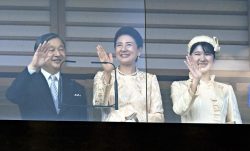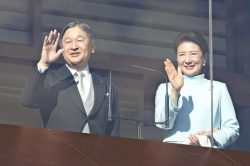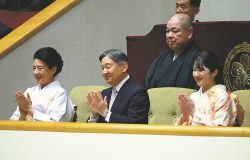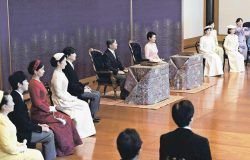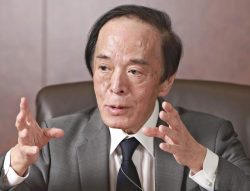Imperial Couple Interacts with Families of War Dead, Ex-Islanders during Their Visit to Iwoto Island
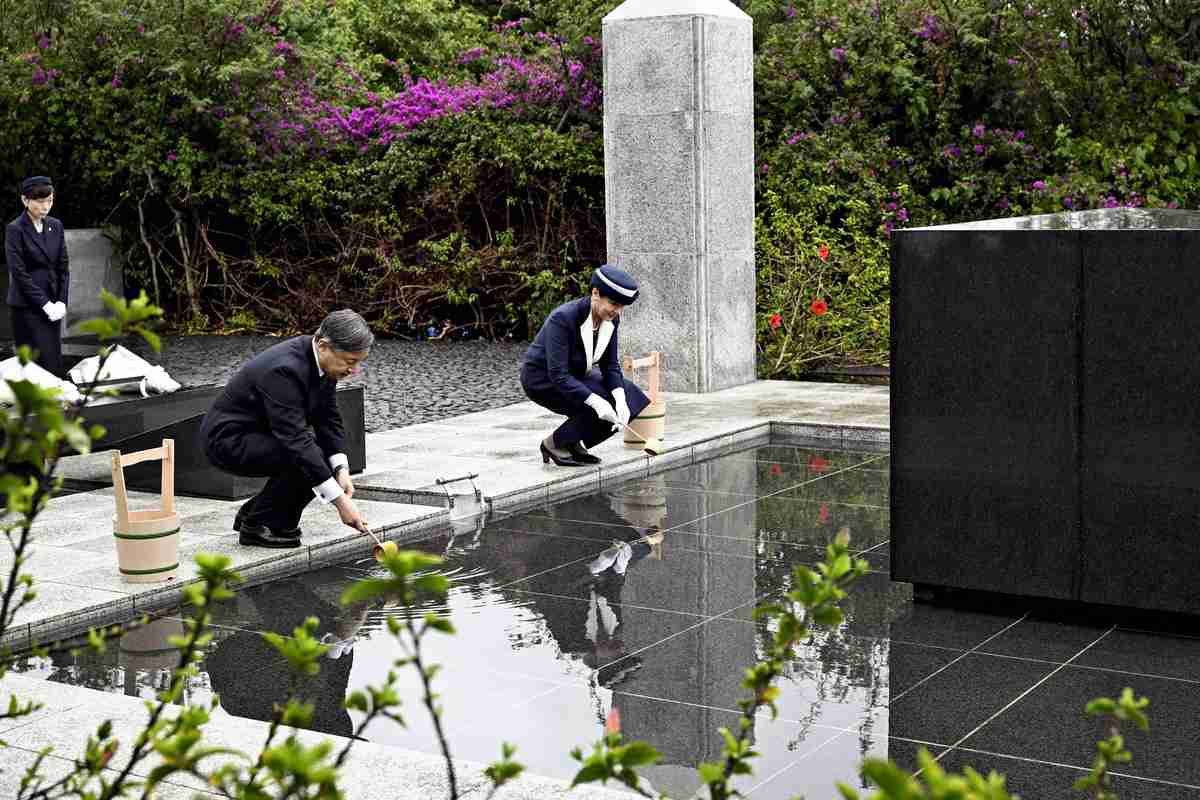
The Emperor and Empress offer water at Chinkon no Oka (Hill of Requiem) on Iwoto Island in the village of Ogasawara, Tokyo, on Monday.
1:00 JST, April 9, 2025
The Emperor and Empress, during their first visit to Iwoto Island on Monday, spoke with families of the war dead and former islanders who were forced to evacuate, listening to their stories of hardships during and after the end of the war.
The island in the village of Ogasawara, Tokyo, was the site of an intense battle between Japanese and U.S. troops near the end of World War II, with the Japanese fatalities at over 20,000. After offering prayers and laying flowers at a cenotaph, the couple met with families of the war dead and former islanders.
“I hear you had great difficulties,” the Emperor said to Tetsuro Teramoto of Shinagawa Ward, Tokyo, who chairs an association of families of those who died on the island.
Teramoto’s father, Yasuo, who belonged to a unit of the Imperial Japanese Army, died on the island. His mother raised five children, including Teramoto, after the end of the war.
“I believe the Emperor is a warmhearted person,” said Teramoto, 80. “I can persevere from tomorrow.”
According to Nippon Izokukai, a Japanese association of families of war dead, the average age of the children of those who died in the war is estimated at about 84.
The Emperor asked Yukio Udagawa, 83, the president of the Association of Tokyo Bereaved Society, “How are the second and third generations?”
When Udagawa told the Emperor about the activities of the society’s youth group mainly comprising third-generation members who are the grandchildren of war dead, the Emperor told Udagawa, “This is important.” The Empress nodded with a serious look on her face.
Before the war, more than 1,000 people lived on the island. Most of them were forced to evacuate, and since then, they have not been able to return.
When the representative of an organization of former islanders said that they had to leave their homes and property behind, the Emperor told the representative, “You all had great difficulties.”
Prior to the conversation with them, the imperial couple visited three memorial facilities on the island on Monday afternoon.
During the war, soldiers died after suffering from hunger and thirst. The couple offered water to the water basin at Chinkon no Oka (Hill of Requiem). There is an underground bunker nearby that was used by the Japanese military. The couple stood at the entrance and heard explanations about the bunker.
At the Iwoto peace memorial park, the couple offered prayers at a cenotaph that has the names of 82 islanders inscribed on it who died after serving in roles such as hauling cargo and cooking meals for the military.
Top Articles in Society
-

Producer Behind Pop Group XG Arrested for Cocaine Possession
-

Man Infected with Measles Reportedly Dined at Restaurant in Tokyo Station
-

Man Infected with Measles May Have Come in Contact with Many People in Tokyo, Went to Store, Restaurant Around When Symptoms Emerged
-

Woman with Measles Visited Hospital in Tokyo Multiple Times Before Being Diagnosed with Disease
-

Australian Woman Dies After Mishap on Ski Lift in Nagano Prefecture
JN ACCESS RANKING
-

Producer Behind Pop Group XG Arrested for Cocaine Possession
-

Japan PM Takaichi’s Cabinet Resigns en Masse
-

Man Infected with Measles Reportedly Dined at Restaurant in Tokyo Station
-

Israeli Ambassador to Japan Speaks about Japan’s Role in the Reconstruction of Gaza
-

Videos Plagiarized, Reposted with False Subtitles Claiming ‘Ryukyu Belongs to China’; Anti-China False Information Also Posted in Japan


